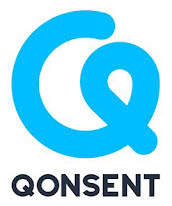TTABlog Test: Is QONSENT Merely Descriptive of Consent Management Services?
The USPTO refused to register the proposed mark QONSENT (in standard character form) for consent management services, deeming the mark to be merely descriptive under Section 2(e)(1). Examining Attorney Gabrielle Rennie maintained that the mark is a slight misspelling of "consent," which merely describes a feature or function of applicant's services. Applicant Redniss argued that the mark combines the words "quality" and "consent," and could be pronounced as “kwahn-sent,” with a soft “Q”. How do you think this appeal came out? In re Jesse Redniss, Serial No. 90622279 (July 12, 2024) [not precedential] (Opinion by Judge David K. Heasley).
The Examining Attorney explained that the purpose of Applicant's SAAS is "to obtain consumers’ consent to collect their private data on websites, to store that private data securely, and to manage third-party access to that private data in accordance with the consumers’ consent." Applicant responded that the word "consent" could be given four different interpretations, and therefore it does not immediately describe his services:
(i) The consent being given by users to Applicant;
(ii) The collection of users’ consent as to how their personal data should be handled by those collecting and storing it;
(iii) The secure “consent repository” database where users’ consent preferences are stored and managed; and
(iv) The “consent” given by Applicant to companies he permits to use the collected data.
The Board first observed that "slight variations in spelling of marks from their traditional spelling does not change the meaning of the term if the underlying term is itself descriptive." As to pronunciation, the Office's evidence showed that "Q" not followed by "U" is often pronounced like a hard "K" or "C" - e.g., NASDAQ, QATAR, IRAQ. Furthermore, consumers would likely pronounce QONSENT as “CONSENT” because of the nature of applicant’s services, known in the field as a "Consent Management Platform," and applicant's company website advertises "[t]he consumer-first approach to consent enablement and engagement."
Applicant’s company’s own use of the word QONSENT on its website and in its press release, echoed in press coverage, indicates that not only Applicant, but a significant portion of relevant consumers, will pronounce and understand the proposed mark as “CONSENT,” describing its consent management platform services.
As to the alternative meanings of "consent" proposed by applicant, the Board found that "all four meanings are descriptive" of his service, and "corroborate its descriptiveness."
And so, the Board affirmed the refusal to register.
Read comments and post your comment here.
TTABlogger comment: Is this a WYHA?
Text Copyright John L. Welch 2023.





5 Comments:
I find it helps your case when you do not include the word portion of the mark in the ID...
I don't agree with this one. In particular, I don’t entirely agree with this proposition: “slight variations in spelling of marks from their traditional spelling does not change the meaning of the term if the underlying term is itself descriptive." That may be true in certain instances, but should be evaluated on a case-by-case basis. I think the Q is a distinctive enough character that it may be suggestive of “consent,” but little more.
Even if the word "consent" did not appear in the recitation of services, applicant's website and advertising would still be a problem
I don't get this one. The Q is dominant. I had to pause to read it, said it aloud, and gave a "clever" check. Source identifier to me.
But I agree: not a good idea to include the mark in the identification of goods. BTW: what do you do if you see your client's registered mark used in someone else's identification of goods: e.g. "VELCRO." Contact the Examining Attorney? File a letter of protest?
Post a Comment
<< Home